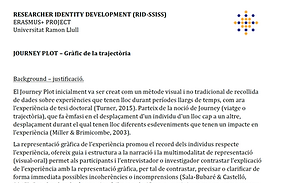
Researcher Identity Development
Supervision of doctoral theses.
How to prevent and cope with problems and incidents?
Doctoral trajectory
-
The doctoral trajectory is divided into 5 phases, each associated to certain processes and products, that can and should overlap.
-
Doctoral education and, especially, the role of the supervisor needs to evolve during the trajectory and adapt to the specific characteristics, challenges and outputs of each phase.
Pre-doctoral
Phase
Initial
Phase
Intermediate
Phase
Final
Phase
Post-doctoral
Phase
1
3
4
5
2
Trial period
Share expectations and purpose
First collaborations
Detailed chronogram
Introduce research group and PhD students
Election members of the Monitoring Committee
Project / Article collaboration
Creation of the supervision team
First conference
Detailed chronogram
Revise expectations and purpose
First peer-review article
Stay
Tribunal election
Career Development
Detailed chronogram
Knowledge transfer
Define future collaborations
Defense trial
Writing the last sections of the theses
New genres, p.e., request for resarch fund
Articles
Starts of Career Development
Conferences
Strategies for a successful doctoral proces
Sharing expectations:
-
The expectations of supervisors and doctoral students are often quite different. It is necessary to address them explicitly and negotiate the relationship and expectations.
Supervisory meetings:
-
Frequency: minimum one meeting every 15 days.
-
The purpose and format of the meetings should not always be the same.
-
The meetings should not only be done to assess products, but also processes.
-
Meetings can be collective or individual.
-
Both supervisor and doctoral have to work before and after the meeting. This makes meetings more productive.
-
Before: clarifying doubts and the process followed to solve them. Defining the agenda.
-
During: Taking notes or records (diaries); show the solutions explored; plan the next steps.
-
After: Defining and sharing agreements.
-
-
Supervision must evolve from a dynamic relationship to a community relationship: involve other members of the team.
We need to offer feedback more focused on the strategies than on the solutions; on the processes that on the products:
-
What have you done (in case of doubt, problem)?
-
Which solutions have you explored? Why?
-
How did you do it?
-
Have you thought about ...?


Pedagogical instruments
Journey Plot
This tool can be used at different times during the doctoral trajectory. At each moment, its use can meet different specific objectives:
-
Start of the doctorate. In the initial stages of the doctoral process, the Journey Plot can be used to generate and negotiate conceptions, representations and expectations about the thesis, the tasks, roles and responsibilities of each actor, share milestones and build the relationship between the supervisor and the doctoral student. In this case, the Journey Plot may be retrospectively done about the previous trajectory of the student, and/or prospectively on the future and expectations of the trajectory during the doctorate.
-
Intermediate phases. In intermediate stages, the tool can be used as a formative evaluation tool, share the meaning of the experiences lived up to the moment, give feedback to the student about their process and development, review and adjust expectations, goals and objectives, redefine roles and responsibilities and regulate strategies to face experiences.
-
End of the doctorate. In the final stage of the doctorate, the Journey Plot can be used to evaluate the process and draw conclusions, but also to plan the student's professional career, identify and discuss options and generate and negotiate expectations about your professional future.
Network Plot

Bibliographical references and web resources
Amundsen, C., & McAlpine, L. (2011). Doctoral Education: Research-Based Strategies for Doctoral Students, Supervisors and Administrators http://doi.org/10.1007/978-94-007-0507-4_3
González-Ocampo, G., & Castelló, M. (2017). Writing in doctoral programs: examining supervisors’ perspectives. Higher Education, 1-15. https://doi.org/10.1007/s10734-017-0214-1
Kobayashi, S. (2014). Learning dynamics in doctoral supervision (doctoral thesis). University of Copenhagen. Department of Science Education.
Kobayashi, S. (2017). Framing doctoral supervision as a formative assessment. ESERA Conference, Ireland.
Paré, A. (2017). Re-thinking the dissertation and doctoral supervision / Reflexiones sobre la tesis doctoral y su supervisión. Infancia y Aprendizaje, 40(3), 407–428. http://doi.org/10.1080/02103702.2017.1341102
Pyhältö, K., Stubb, J., & Lonka, K. (2009). Developing scholarly communities as learning environments for doctoral students. International Journal for Academic Development, 14(3), 221–232. http://doi.org/10.1080/13601440903106551
Pyhältö, K., Vekkaila, J., & Keskinen, J. (2015). Fit matters in the supervisory relationship: doctoral students and supervisors perceptions about the supervisory activities. Innovations in Education and Teaching International, 52(1), 4–16. http://doi.org/10.1080/14703297.2014.981836
McAlpine, L. (2013). Doctoral supervision: Not an individual but a collective institutional responsibility. Infancia y Aprendizaje, 36(3), 259–280. http://doi.org/10.1174/021037013807533061
McAlpine, L., & McKinnon, M. (2013). Supervsion - the most variable of variables: Student perspectives. Studies in Continuing Education, 35(3), 265–280. http://doi.org/10.1080/0158037X.2012.746227
Sala-Bubaré, A., & Castelló, M. (2017). Exploring the relationship between doctoral students’ experiences and research community positioning. Studies in Continuing Education, 39(1), 16-34.
"Journey Plot helped us to retrospectively capture the most significant experiences in the doctoral studies of our participants, place them in time and get a sense of their trajectory. In turn, the Communities Plot instrument promoted students’ reflection and detailed description of their scientific network and their relationships with the different significant agents. Moreover, they are valuable tools for raising students’ awareness about their PhD experience"
Sala-Bubaré & Castelló (2016, p.16)
Download the article Doctoral Supervison.
"supervision should be conceptualized as a collective institutional responsibility that calls for explicit educational and curricular consideration; it should not be individually improvised, but rather be the result of thoughtfully structured curricular support for the student and supervisor."
McAlpine (2013, p.259)



